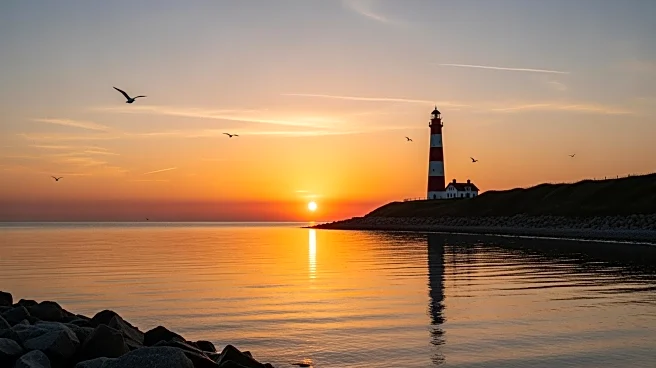What's Happening?
The North Sea tourism sector is experiencing a significant downturn, as highlighted by the North Sea Tourism Report 2025 (NTR25). The report indicates a 13.2% decrease in holiday potential from 2022 to 2025, with further declines anticipated in 2026.
This trend is attributed to a shift in visitor preferences post-pandemic and economic pressures such as inflation. The report notes a divergence in expectations between repeat visitors, who are avoiding crowded areas, and newcomers seeking novel experiences. This mismatch is causing a decline not only in Germany but also in Danish and Dutch North Sea regions, as well as the German Baltic coast. The report warns that prioritizing volume over value could lead to failure, urging tourism managers to bridge the gap between different visitor groups.
Why It's Important?
The decline in North Sea tourism has broader implications for the regional economy and the tourism industry at large. The shift in visitor preferences highlights the need for the industry to adapt to changing demands, focusing on value rather than volume. This situation presents both challenges and opportunities for stakeholders. On one hand, the decline could lead to economic losses and job cuts in the tourism sector. On the other hand, it offers a chance to innovate and cater to emerging market segments, such as luxury-seekers and environmentally conscious families. Successfully addressing these changes could lead to a more sustainable and resilient tourism model, potentially setting a precedent for other regions facing similar challenges.
What's Next?
To counteract the decline, the NTR25 suggests strategic changes, including enhancing digital expertise to attract wellness travelers, improving infrastructure for family-friendly green spaces, and using data-driven personalization to appeal to luxury customers. The report emphasizes the need for a balanced approach, combining high-end offerings with affordable family options. As 2026 approaches, tourism businesses along the North Sea coast must adapt to these recommendations to remain competitive. Failure to do so could result in further declines, while successful adaptation could lead to growth and long-term sustainability.
Beyond the Headlines
The decline in North Sea tourism also raises questions about the future of mass tourism and its environmental impact. The shift towards more sustainable and personalized travel experiences reflects a broader trend in the industry, where consumers are increasingly prioritizing environmental concerns and unique experiences over traditional mass tourism. This could lead to long-term changes in how tourism is marketed and managed, with a greater emphasis on sustainability and quality over quantity.














